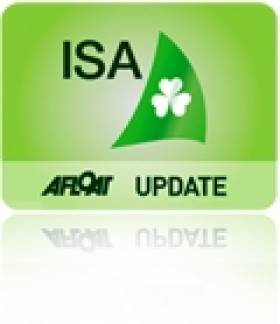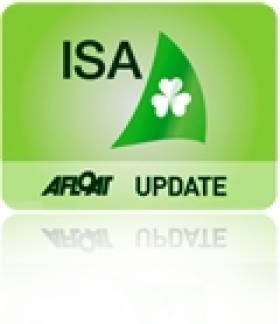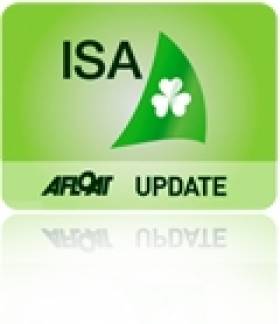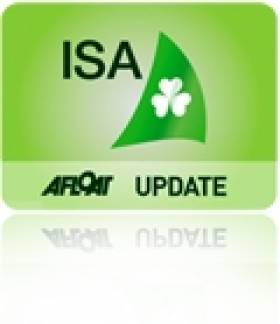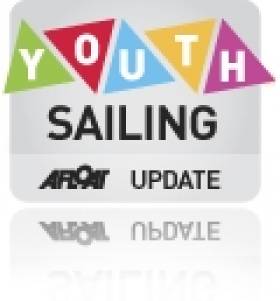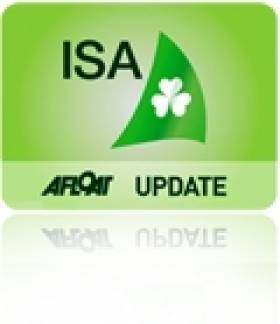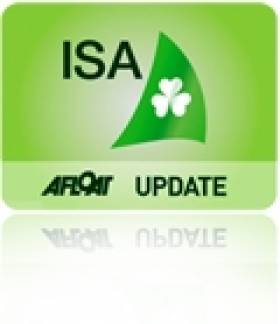Displaying items by tag: ISA
The ISA May Have Changed; Do Our Clubs & Classes Want To Change?
#isastrategicplan – Afloat's occasional blogger 'Magerhamore' listened to the recent presentation of the ISA Strategic Plan and question and answer session in Dun Laoghaire last Wednesday and the following thoughts have come to mind:
The ISA seems to have radically transformed it's attitude. The Strategic Plan sets out clear strategies for developing sailing. However, at the centre of these strategies is a clear mission for the ISA to assist and support Sailing Clubs, Sailing Classes and Training Centres. The ISA may have changed; do our clubs and classes want to change? If they do, then things will happen. If they do not then nothing will change.
The present club model is largely based on offering a service to a relatively small number of boat owners, their families and their crew (many of who may not be members of the club). Many potential sailors (and their parents) have neither the intention or the finance to purchase a boat. Furthermore, present training schemes do not necessarily teach the skills needed to maintain and improve a boat.
If sailing is to tap in to the large potential market for sailing then clubs will have to change model, and develop 'pay for play' type activities. It is important to emphasise that this 'pay for play' should not be limited to beginners. There are many pathways into competition at the very highest level for those who do not own their own boats, including team racing and match racing. Worldwide, many events are based on charter fleets and many class championships are dominated by club owned boats.
The skills to operate such schemes exist in Ireland... but not necessarily in the clubs. Many training centres own and operate large fleets of boats. That expertise needs to be transferred to the clubs.
The long term development of year round activities - training, coaching, running 'pay for play' requires a radical transformation of the training and employment of instructors and especially senior instructors. If clubs are to develop new activities then they need full time, permanently employed staff with the management skills to run a sailing base. There are many Irish sailors with the required experience and skills.Very few of them work in Ireland.
Sailing needs to be ambitious. We are an island nation with a similar population to New Zealand. We have an incredible playground, our lakes and coastal waters, on our doorsteps. Sailing should be one of Ireland's biggest participant sports. Our ambition,should be that in a few years there are more active participants in sailing (a sport for life) than in Gaelic Football, Soccer or Rugby. This will not happen without a complete transformation of the way we manage and develop our sport.
A potential future Irish Ben Ainslie may be living in Tallaght, Tullamore or Termonfeckin. He or she will probably never set foot on a boat, or never enter a sailing club. Without parents willing to spend considerable sums he or she will never attain their potential. Surely our role is to allow all of those who want to mess about in boats the opportunity to do so.
READ MORE FROM MAGHERAMORE? How clubs can cash in on sailing's spectator appeal; The 'Great Dinghy Sailing Debate' Means Questions for ISA & Yacht Clubs; Is 'Adventure Sailing' a New Tack for Dinghy Sailors?
Dublin Yacht Club Commodores First to Welcome New Irish Sailing Association (ISA) Strategic Plan
#sailing.ie – Dublin Yacht Club Commodores have been the first to greenlight a new Irish Sailing Association (ISA) agenda mapped out at the Royal St. George Yacht Club yesterday.
Over 60 gathered to hear former president Neil Murphy give details of the new five year strategic plan that was favourably received by a range of sailors who had plenty of questions for President David Lovegrove. Topics covered included; training, instructors, VHF certification, how dinghy classes fit in to the new arrangements and the association's new Regional Development Officer.
Afloat.ie reviewed the Strategic Plan HERE where it is also available to download as a PDF file.
The Plan is for the period 2015 - 2020 and is based on the views that were put to the Strategic Review Group. The SRG was asked by the Board in 2013 to assess where the Association stood and how it needed to adjust to better serve the sport of Sailing. The Board accepted its Report and tasked a group to prepare a new Strategic Plan for the ISA based on its contents.
Significantly, Norman Lee, the Wicklow based small boat sailor who sought – and has now got – fundamental change at the ISA, has welcomed the plan: 'My feelings are very positive, this has been a very positive and uplifting experience and if it continues in the way proposed, will turn Irish sailing around and be the prototype for similar change needed in other jurisdictions', he told Afloat.ie More from Norman on the topic HERE.
The underlying principle of the Plan is moving from a 'governance approach' to one of the principal stakeholders in the Sport working together with goal of encouraging and developing participation. The Association, Clubs, Training Centres, Classes and associated groups working in union to achieve those objectives underlies all of the strategies. There will be a renewed emphasis on utilising the input of volunteers to harness the skills and knowledge of active sailors so that the ISA can evolve and develop and respond to issues that arise.
'The initial vibe seems to be that the ISA has listened, strategised and truly re-connected with the Irish sailing community. Sure, there were valid issues raised that need looking at, especially in relation to cruising and training. But if that connection and dialogue is truly there again, well then what obstacles can't be overcome? In my particular area of interest – racing – the really exciting thing I see is the willingness to address structural issues that can make our sport too exclusive and competitive, especially for young sailors", Sean Craig, a one design dinghy and keelboat sailor, who was part of the the review group, told Afloat.ie
The primary role of the Clubs in growing the sport locally, attracting newcomers and maintaining the interest of both existing and new members is acknowledged. Better linkages between Clubs and Training Centres for their mutual benefit are proposed. This is in the knowledge that most newcomers interested in taking up Sailing feel more comfortable in approaching a Training Centre than a Club but the long term involvement of sailors in the sport is best ensured by them joining Clubs, participating in Club activities and enjoying the benefits - both practical and social - that membership provides.
'There was great positivity at the review meeting - it is clear that the ISA has listened to its members and the SRG team deserves much credit for creating strategies that can make a real difference going forward – to this end, we are more than willing to work with the Association to enhance our sport', Graham Smith Commodore of Malahide Yacht Club told Afloat.ie
'The Royal Irish Yacht Club welcomes the Strategic Plan prepared by the ISA, and will encourage the Club's involvement in its implementation. We are hopeful that this initiative heralds a new level of communication and interaction among all members of the sailing community, to the long-term benefit and enjoyment of this sport and recreation' said RIYC commodore James Horan.
The appointment of Regional Development Officers to assist Clubs and Training Centres has been one of the ISA success stories in recent years and it is proposed to increase their availability to Clubs and Training Centres. The Board has already decided to add a further RDO to the two existing appointments to ensure the local availability of expertise and advice and facilitate greater co-operation and coordination between local Clubs and with Training Centres.
The over elaborate structure of ISA training courses and the difficulties of qualifying, retaining and upskilling instructors was a widespread complaint when the Review Group conducted their research. Strategies to resolve those problems are proposed.
An often expressed view about the Club Training schemes for Junior sailors is the amount of effort committed to running courses by Clubs and the relatively poor transfer rate from the courses to Club involvement and activity afloat. It is planned to refocus the training courses away from a 'certificate chase' to an emphasis on developing the skills learned. An online sailing passport scheme to supplement the paper based certificate system is proposed. It will be trialled in the coming season and will allow the recording of both course attendance and other time afloat, whether racing or leisure sailing.
A strategy of encouraging the training of young sailors in two person boats, as opposed to single handed craft, is proposed, with a view to improving both their technical and social skills. A renewed emphasis on sailing being a sport for life and avoidance of the risk of sailor burnout by compressing skills acquisition into young sailors' early teens, are envisaged.
The redressing of the perceived imbalance between the support structures for those competing in the non-Olympic area and those involved with the High Performance area - essentially the Olympic arena - is proposed. This will not affect the support for the High Performance sector, which is funded through the good offices of the Irish Sports Council, but will instead propose that the support available to other areas of competition will be enhanced. Better access for Clubs and Classes to coaching at local level is one of the principal strategies envisaged and it is hoped that Clubs and Classes will be able to access both coaches with a High Performance background and those with experience of specific Classes.
It is proposed that the ISA should re-commence the co-ordination of a racing event calendar to facilitate the avoidance of clashes between events and re-establish the balance between local, regional and national events.
Former president Niamh McCutcheon who attended the meeting received a favourable mention from David Lovegrove who he said 'had the foresight to initiate this engagement'.
Similar meetings are planned as follows:
Tue 17 Feb 15 7pm-9pm Cork, Rochestown Park Hotel
Tue 24 Feb 15 7pm-9pm Galway, Galway Bay Sailing Club
Irish Sailing's New Strategic Plan Charts 2020 Course
#isa – Two years after a heave against the Irish Sailing Association (ISA) a new five year strategic plan has been published writes David O'Brien in this morning's Irish Times sailing column HERE.
The Plan is for the period 2015 - 2020 and is based on the views that were put to a 'Strategic Review Group'. The SRG was asked by the Board in 2013 to assess where the Association stood and how it needed to adjust to better serve the sport of Sailing. The Board accepted its Report and tasked a group to prepare a new Strategic Plan for the ISA based on its contents.
This blueprint (downoad the draft plan below as a 2mb pdf file) looks like a positive step forward not least because it makes an attempt to implement measurable targets for the good of grass–roots sailors. That rule was something lacking on a now scrapped 2020 vision document sub–titled 'grow the sport, grow the membership, grow the organisation'. This discredited plan turned out to be boom time folly and like so many other projects around the country at that time, poorly thought out and only half–built.
On foot of it, in 2013 a band of dissenting sailors held the ISA to account for its lack of performance. Back then, association efforts were more focussed on getting the ISA genie back in the bottle than the sport back on track. In a push for change at the National Yacht Club (NYC) in April 2013, the embattled body heard over 300 suggestions for change.
Not least was the fact sailing had lost a quarter of its members in recession and key yacht clubs are still in choppy financial waters. A massive fall off of junior sailors also presented an inconvenient truth that problems lay not with the children but with the paucity of guidance for newcomers.
Sailors like Norman Lee and Bryan Armstrong were joined by former president Roger Bannon (now its Treasurer) in calling for fundamental reform.
'The ISA has lost its way over the last few years," Bannon wrote in March 2013, giving his view of a bureaucracy 'detached from the reality of what is going on in the front line'.
Around the same time, County Wicklow dinghy sailor Lee said he wanted 'the ISA focus off elite sailing and the emphasis instead to be on enjoying sailing for fun as per the association's own articles of association'.
Two years on, an independent group of sailors has charted a new course but does this revised game plan satisfy these demands? Will it be a boost for clubs and classes, particularly smaller ones, or is the only comfort for them the fact that the process took place?
The underlying principle of the Plan is moving from a 'governance approach' to one of the principal stakeholders in the Sport working together with goal of encouraging and developing participation. The Association, Clubs, Training Centres, Classes and associated groups working in union to achieve those objectives underlies all of the strategies. There will be a renewed emphasis on utilising the input of volunteers to harness the skills and knowledge of active sailors so that the ISA can evolve and develop and respond to issues that arise.
The approach is in a logically presented format but there is very little that suggests the ISA will support ageing, less popular class associations, preferring rather to put faith in the bricks and mortar of clubs and training centres to strengthen access and participation avenues for current and potential sailors.
While many of the strategies are laudable, there will be difficulties in operating them, particularly where they are dependent on the vigour, enthusiasm and skills of volunteers at club level.
Indeed, there may be some instances where ISA aspirations are in direct conflict with local trends and activities. For example, what will the Optimist and Laser classes say to the strategy of 'encouraging participation of younger sailors in two person boats' or the dinghy classes about the strategy of encouraging crewing in keelboats.
The scenario will create debate about the professional structure required to deliver on its aspirations particularly in the training area. Suitably qualified personnel are necessary to negotiate the tricky waters disturbed by the demands of the multiple agencies with a stake in the sport and its delivery – HSA, Department of Transport, Department of Education.
At the same time it would appear that the working plan appears to validate the ISA's High Performance department as many of the strategies suggested are actually currently operational.
There are a number of curious omissions:
·No mention of Paralympic sailing in the High Performance section
·No mention of Youth Worlds, a fertile ground for ISA recently
·No mention of financing the association, strangely in light of the discussion around its joint membership scheme.
Where does the balance lies when gauging the benefit of an organisation producing a strategic plan – is it the outcome or the process that is the more valuable exercise? Or worse still, is it the creation of a stick to be beaten with further down the road if targets are not achieved.
The ISA has been fortunate in being able to rely on some excellent volunteer directors for the overhaul process. The combination of effectiveness and commitment of the new board has brought the association a long way in a short time but how sustainable is this voluntary effort over time?
One doer maybe better than forty talkers but effective volunteers are hard to find. Finding an ISA President a year ago was not without difficulty in itself. In the absence of such voluntary effort, and with the benefit of experience, can the professional staff see this new plan through or is more help needed?
As a draft, this document will no doubt undergo some change in the process that now follows. And while there have been some changes at the ISA's Park Road HQ, the evolution of the ISA from the Ursula Maguire administered one-person organisation of 20 years ago continues with a relatively minor correction of the set and drift that had crept in in recent years. Are more changes still to come? Will there be a replacement for the recently departed training director? Perhaps too someone is also needed to support the club racing side – maybe in conjunction with the Irish Cruiser Racing Association (ICRA)?
The appointment of Regional Development Officers to assist Clubs and Training Centres has been seen as one of the ISA success stories in recent years and it is proposed to increase their availability to Clubs and Training Centres. The Board has already decided to add a further RDO to the two existing appointments to ensure the local availability of expertise and advice and facilitate greater co-operation and coordination between local Clubs and with Training Centres.
The primary role of the Clubs in growing the sport locally, attracting newcomers and maintaining the interest of both existing and new members is acknowledged. Better linkages between Clubs and Training Centres for their mutual benefit are proposed. This is in the knowledge that most newcomers interested in taking up Sailing feel more comfortable in approaching a Training Centre than a Club but the long term involvement of sailors in the sport is best ensured by them joining Clubs, participating in Club activities and enjoying the benefits - both practical and social - that membership provides.
The over elaborate structure of ISA training courses and the difficulties of qualifying, retaining and upskilling instructors was a widespread complaint when the Review Group conducted their research. Strategies to resolve those problems are proposed.
An often expressed view about the Club Training schemes for Junior sailors is the amount of effort committed to running courses by Clubs and the relatively poor transfer rate from the courses to Club involvement and activity afloat. It is planned to refocus the training courses away from a 'certificate chase' to an emphasis on developing the skills learned. An online sailing passport scheme to supplement the paper based certificate system is proposed. It will be trialled in the coming season and will allow the recording of both course attendance and other time afloat, whether racing or leisure sailing.
A strategy of encouraging the training of young sailors in two person boats, as opposed to single handed craft, is proposed, with a view to improving both their technical and social skills. A renewed emphasis on sailing being a sport for life and avoidance of the risk of sailor burnout by compressing skills acquisition into young sailors' early teens, are envisaged.
The redressing of the perceived imbalance between the support structures for those competing in the non-Olympic area and those involved with the High Performance area - essentially the Olympic arena - is proposed. This will not affect the support for the High Performance sector, which is funded through the good offices of the Irish Sports Council, but will instead propose that the support available to other areas of competition will be enhanced. Better access for Clubs and Classes to coaching at local level is one of the principal strategies envisaged and it is hoped that Clubs and Classes will be able to access both coaches with a High Performance background and those with experience of specific Classes.
It is proposed that the ISA should re-commence the co-ordination of a racing event calendar to facilitate the avoidance of clashes between events and re-establish the balance between local, regional and national events.
Now the process of re-evaluation has begun, the ISA is urging all sailors to play a role to win back participation in sailing. A green light from clubs and classes is key to this plan's success.
The following regional meetings are taking place:
Wed 21 Jan 15 7pm-9pm Dublin, Royal St George Yacht Club
Tue 17 Feb 15 7pm-9pm Cork, Rochestown Park Hotel
Tue 24 Feb 15 7pm-9pm Galway, Galway Bay Sailing Club
Irish Sailing Association Seeks Third Regional Development Officer
#jobs – The Irish Sailing Association (ISA) is recruiting an additional Regional Development Officer (RDO) for the Eastern Region and will redefine the territories of the two existing RDO's.
The new post follows the announcement recently by ISA president David Lovegrove, that the core body is to create a more cost effective structure providing accessible expertise at a local level to help Clubs and Affiliated Organisations, increase and retain members. As part of this development key resources are being redirected at a local level through the investment in Regional Development Officers. Details are below.
Position: ISA Development Officer
The ISA is the National Governing Body recognised by the Irish Sports Council for all forms of competitive and recreational activities involving sail and engine powered craft. Due to staff changes and the continued roll out of the ISA's Regional Development Programme, the ISA is looking to appoint a Regional Development Officer to join the ISA's professional team.
The prime role of the Regional Development Officer is to provide support to member clubs and affiliated organisations for the purpose of increasing activity and participation. The successful candidate, who will be based in the Eastern Region, will work in conjunction with the existing officers based in the Southern and Western Regions.
Ideally the candidate will be an active sailor with a broad knowledge of the ISA, including the structures and relationships with Clubs, Class Associations and Training Centres, ISA training schemes as well as racing & competition structures within the sport.
They will:
• Report directly to the ISA Chief Executive and support him with the delivery of the ISA's annual operational plan agreed by the Board.
• Join the existing Regional Development Team to work with ISA affiliated Clubs and accredited Training Centres to grow and develop their activities, customer base and membership.
• Promote and develop specific programmes and initiatives in line with ISA strategies, to increase the numbers of people participating in the sport.
• Develop links between ISA Clubs, Training Centres and Local Bodies in the region.
• Improve communications and liaison between ISA, Clubs and Training Centres
• Support the development and implementation of the ISA Training Programmes
• Support the ISA strategy to establish a regional development network.
The successful candidate will:
• Have a knowledge of Club and Training Centre structures and activities.
• Have good racing knowledge and experience
• Have initiative, be flexible, creative and have the ability to work within a small team environment
• Have high levels of energy, enthusiasm and commitment. He/she will be well organised and be capable of communicating effectively.
• Will have a professional and proactive style with excellent interpersonal skills.
• Be computer literate with IT skills and experience of Microsoft office applications
Salary will be negotiable depending on experience and qualifications.
Letter of application and CV should be sent to Harry Hermon, Chief Executive by email to; [email protected]. Closing date for receipt of applications is Wednesday 14th January 2015
2015 Will be 'Pivotal Year' for Irish Sailing Association
#sailing.ie – Irish Sailing Association (ISA) President David Lovegrove gives an update on a fundamental restructure of the organisation
Following the AGM in March 2014, the Board of the ISA received the report of the Strategic Review Group chaired by Brian Craig. In response to its extensive recommendations, the Board initiated a fundamental restructure to re-establish the organisation's relevance to its membership and focus its energies and capabilities on core activities.
Organisational and governance changes have been adopted together with a rationalisation of the professional team, a significant reduction in overheads and the disposal of surplus assets.
These changes allow resources to be re–allocated more directly into providing support at regional and club level and also reflect a change in emphasis from that of largely performing a regulatory role to one of being a source of active guidance at grass roots. This will be achieved within a cost structure which is realistically matched to the existing income profile.
In consultation with the Board and the recently formed Policy Groups, which are a valued source of expert advice on key areas of policy and activities, the Strategic Planning Group under the Chairmanship of Neil Murphy, is developing a new 5 year Strategic Plan 2015-2020. Following consultation with clubs and affiliated organisations in the New Year, this will be presented for consideration and approval at the next AGM in March 2015.
In the meantime, major changes to communications and PR are being implemented with a new website to be launched early in 2015, a collaboration agreement being signed with Afloat Magazine and a newly formatted high profile event, details for which will be announced shortly, that will pay tribute to our sailing achievers at both international and national level.
The training area will see innovative initiatives in 2015 with the launch of an online logbook for the Small Boat Sailing Scheme, the publication of a Junior Organisers' Handbook and the appointment of National Trainers for Sailing, Windsurfing and Power Boating. A Pathway for clubs looking to develop more double –handed sailing at local level for juniors will be finalised in 2015.
The ISA will also focus on developing a structured approach designed to make Coaching resources more readily accessible to sailors of all abilities and interests, including keelboat sailors, and ensure a trickle down benefit from the outstandingly successful High Performance programme.
With a revised and extended structure of Regional/Sailing Development officers, the ISA foresees working much more closely with Clubs, Class Associations and the Irish Cruiser Racing Association to coordinate plans for increased participation levels and sharing of resources. As part of this, it is planned to develop a comprehensive database on racing activities both at Club and at National level. Addressing this lack of information is regarded as key to the development of strategies to enhance and grow racing activity levels.
Cruising represents a large constituency of regular sailors and in consultation with The Irish Cruising Club and other established cruising groups, it is proposed to become more supportive in serving these interests by assisting in organising cruising symposiums, promoting Cruise –in–Company initiatives and providing reliable information on berthing facilities and visitor moorings around the country.
Increasing participation in sailing has long been a strategic objective of the ISA and if club membership and participation levels at many sailing events are an accurate indication of activity, it is clear that a major challenge to be confronted exists in making the sport more accessible and attractive to new participants. We also need to ensure that those who are regularly involved in the sport, but not necessarily as members of clubs, can find cost–effective ways of becoming more formally integrated into our club infrastructure.
During this re–direction of emphasis, it remains a major priority for the ISA to continue delivering its current range of services and competently discharge its responsibilities as the National Governing Body for Sailing.
2015 will be a pivotal year in executing this new direction for the ISA and success will be heavily reliant on the contribution and interaction of all sailors, whatever their interests or needs.
Finally, a big thank you is warranted to the professional team in the ISA and to all the volunteers who have energetically and generously contributed to what has been a very challenging eight months for the ISA.
David Lovegrove,
President
Irish Sailing Review 2014: A Year Of Hope, Regeneration & Success
#irishsailingreview – 2014 has been the year in which Irish sailing regained its international confidence afloat by re-capturing the Commodore's Cup. Having won it in 2010, the national economic collapse prevented any defence in 2012, but in July 2014 the stain and shame of 2012's non-appearance was emphatically wiped from memory with a convincing team victory led by Anthony O'Leary.
Ashore meanwhile, it had taken longer in some quarters for the economic realities to become fully evident and accepted. But for the Irish Sailing Association, a grassroots revolution within the national authority and sailing in general in 2014 resulted in a root-and-branch analysis of the workings of the Association, which had been heading towards financial disaster through a combination of over-staffing, grandiose schemes of expansion and empire-building, and an emphasis on activities and programmes which were remote from the needs of ordinary sailors throughout Ireland.
It took six months to turn round the course of the Association. But on November 5th 2014 the new ISA President, David Lovegrove, was able to announce a far-reaching re-structuring which is already resulting in a leaner and fitter body, better able to provide a realistic service for clubs and the huge diversity of recreational activity on Ireland's seas and lakes.
While all this high profile activity and action has been taking place at international and national level, those Irish sailors who had managed to keep up their sport through the financial downturn – albeit in often very reduced circumstances – continued to sail their boats with the attitude that, while the economic situation was disastrous, it mustn't be allowed to become serious, and in some ways the best course out of the recession was to sail through it. W M Nixon casts an eye over the year's main activities.
In the Irish sailing year, Christmas Day is New Year's Eve. Next morning, on December 26th – St Stephen's Day or Boxing Day or whatever you're having yourself – the annual 628-mile Sydney-Hobart Race starts. It may be on the other side of the world, and it may still be in the very last days of the old year. But Irish interest at home and in Irish-Australia is always high, and in the sailing community it's seen as the start of the new season.
December 26th 2013 was in line with this, as we'd ex-Pat superstar Gordon Maguire – a previous Hobart race overall winner – very much in contention with Matt Allen's totally new Carkeek 60 Ichi Ban, we also had Sean McCarter of Lough Swilly YC skippering Derry/Londonderry in the warmly-welcomed Clipper Fleet of 70-footers designed by Tony Castro (formerly of Crosshaven) which were taking in the Hobart race as part of their global circumnavigating race, and we'd Barry Hurley and Kenny Rumball on the First 40 Breakthrough knowing that in the 2010 Hobart race, the new design's race debut, First 40s had taken first and second overall.
In a rugged race in which the wind got up to gale force and more towards the end, it was a much-loved hundred footer, Bob Oatley's continually-modified Wild Oats XI, which stole all the headlines with line honours, a course record, and a class win. Irish hopes were best met by Sean McCarter, who logged a very clear win in the Clippers. As for Ichi Ban, while she was third in IRC Div 1 and 8th overall, it wasn't quite a stellar performance, reinforcing the views of those of us who think the boat may be just a little too plump by today's lean and hungry standards. And aboard Breakthrough, they'd 8th in class and 29th overall, a useful performance perhaps, but Barry Hurley will be back on December 26th 2014, boosted by his first in class and second overall in October's Middle Sea Race.
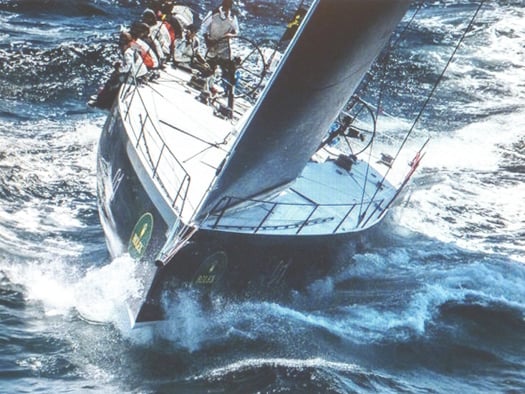
Matt Allen's Ichi Ban in the Rolex Sydney-Hobart Race of 2013, with Gordon Maguire as sailing master. To some observers, the very new Carkeek 60 seemed distinctly plump in her hull form forward compared to her closest competitors
In late January 2014, attention focused on the Quantum Key West Regatta in the Florida Keys, where Irish Olympic sailor Peter O'Leary of Cork was on the strength of New York art dealer Marc Glimcher's completely new and very potent looking Ker 40 Catapult. The boat did the business afloat in Florida, but further business was done ashore, as Anthony O'Leary himself was in Key West to see if he could sign up Catapult to be the secret ingredient in Ireland's Commodore's Cup team, for which at that stage the only certainty was his own older Ker 39 Antix. There seemed to be agreement, but in the volatile world of international trading and snap decisions in which top modern sailing operates, there can be sudden reversals of fortune, and O'Leary later admitted that until Catapult was actually unloaded from a ship in Europe, he hadn't been a hundred per cent certain she'd show.
Key West had further Irish interest in that veteran skipper Piet Vroon's Ker 46 Tonnere de Breskens – a former Round Ireland Race winner – was another star in the show, but much was to happen in Irish sailing before the Round Ireland 2014 got under way in Wicklow on June 28th.
With March slowly showing signs of Spring, university racing came centre stage, and it was University College Dublin which came through on top to qualify as Ireland's representatives in the Student Yachting Worlds in France in October, the team led by Philip Doran.
Another team was emerging as the Irish Cruiser Racing Association (ICRA) announced that our Commodore's Cup squad would be Anthony O'Leary's Ker 39 Antix, Marc Glimcher's Catapult, and the Grand Soleil 43 Quokka chartered by Michael Boyd and Niall Dowling, with Anthony O'Leary as team captain. He in turn would be supported by the shore management team, for a very intense week of racing, of Barry Rose and Fintan Cairns, with Mike Broughton in what would prove to be the particularly onerous task of Team Meteorologist.
As 2014 was exactly midway between two Olympiads, top level international dinghy sailing to Olympic standards might have been expected to be on the back burner. But Ireland's Olympians were very much on track on the international scene, and busy with their own programmes which culminated in the ISAF Worlds in Santander where Olympic places in Rio de Janeiro for 2016 were secured by James Espey in the Laser, Ryan Seaton & Matt McGovern in the 49er, and Annalise Murphy in the Women's Laser Radial. All were of course also seen in other boat types from time to time, with Annalise in particular bringing some glamour to the growing class of foiling Moths in Ireland.
Annalise on the foiling Moth
Other top international women sailors had descended on Ireland in early June with the ISAF Women's Match Race Worlds at Crosshaven. It's very much a specialist sailing interest, but aspiring Irish woman sailors attracted to this discipline found that this successful regatta provided some very useful networking contacts and future crewing possibilities, while the racing itself saw Sweden's Anna Kjellberg of the Royal Gothenburg YC become the new champion after defeating Camilla Ulrikkeholm of Denmark in the final.
In an entirely different area of sailing and life afloat, the traditional boat scene had come early to life with the Baltimore Wooden Boat Festival at the end of May. In the Irish climate after a particularly damp Spring, it reflected great credit on those involved that there was such a good turnout, ranging from the Shannon Gandelows from Limerick recently returned from their historic visit to Venice, through the many restored classic yachts of the region, also including the lovely Shannon cutter Sally O'Keeffe from Kilrush, and going on into the restored traditional mackerel and lobster yawls which make West Cork their home.
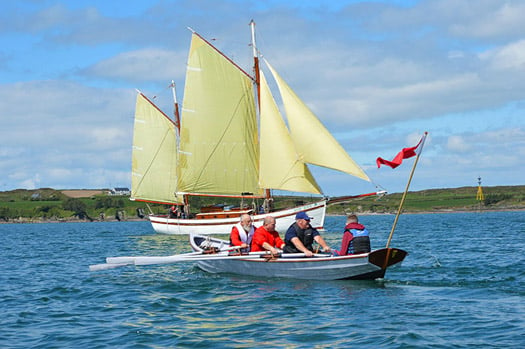
Shortly after their historic visit to Venice, the Shannon gandelows built by the Ilen School took part in the Baltimore Wooden Boat Festival at the end of May. The gandelow here, rowed by Liam O'Donghue, Anthony Kenny and Robert Samlle, is headed across Baltimore Harbour towards the gaff ketch Sile a Do.
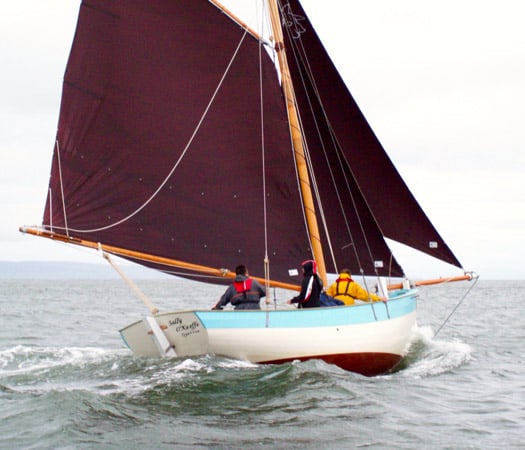
The pride of the Shannon Estuary - Sally O'Keeffe was built in a community effort in Querrin on the Loop Head peninsula.
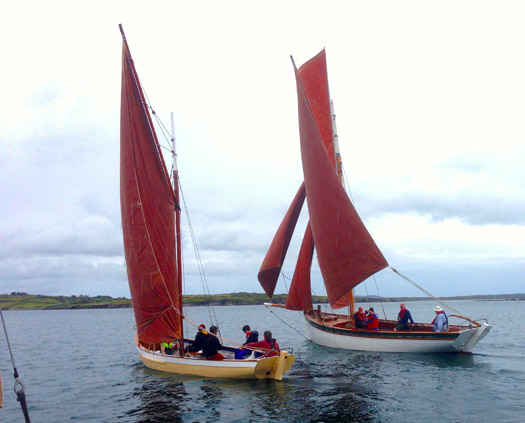
The traditional lobster boat Saoirse Muireann (left, Cormac Levis) and the mackerel yawl An tiscaire (Uilliam O'Lorcain) are a familiar sight in the waters of West Cork. Photo: Brian Marten
They were to re-appear in even greater numbers at the Ballydehob Gathering of the Boats in early August, a month during which the classic Galway Hookers of the West Coast were at their busiest on their home Atlantic waters, but the East Coast also had its moments with the Riverfest in Dublin's Liffey in early June seeing traditional and classic craft in a lively mix.
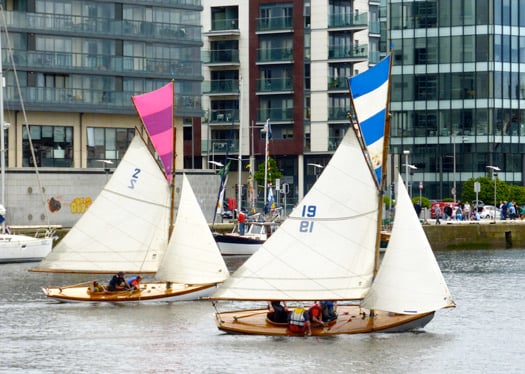
Sails in the City – two of the 1898 Howth Seventeens racing in the heart of Dublin in the Liffey Riverfest. Photo: W M Nixon
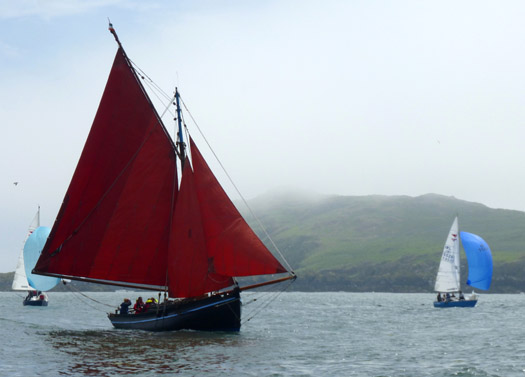
It could almost be Connemara, were it not for the Puppeteer 22s – the Galway Hooker Naomh Cronan in the new Classics & Traditional Division in Howth's annual Lambay Race, which was marking its 110th anniversary in 2014. Photo: W M Nixon
Indeed, so strong is the growing interest in classics and trads on the East Coast that to celebrate the centenary of the Lynch family's Howth 17 Echo (one of the newest of the class, the most senior ones were built in 1898) Howth YC provided a traditional Lambay Race course – simply up around Lambay and back to Howth Harbour – for the Seventeens and a new Classics Division, with the Howth 17s seeing the first two places taken by 1898 boats – Rita (John Curley & Marcus Lynch) and Aura (Ian Malcolm) – while Old Gaffers Association International president Sean Walsh won the classics with his Heard 28 Tir na nOg from the Clondalkin team's Galway Hooker Naomh Cronan. As for the overall prize among the large fleet of more modern boats sailing their more complex course, that was won by Colm Bermingham's Bite the Bullet.
The countdown to the Commodore's Cup had continued with inspirational performances by Anthony O'Leary in the Easter Challenge in the Solent, where he won his class with Antix, and then in June he did the same again with the British IRC Championship. Back home, ICRA held their Nationals with the Royal Irish YC in Dun Laoghaire in mid-June, and out of a fleet of a hundred plus boats it was the vintage Marcus Hutchinson/Rob Humphreys designed Quarter Tonner Quest (Jonathan Skerritt, RIYC) which was best overall scorer, a notably impressive performance also being put in by the Ker 36 Jump Juice (Denise Phelan) from Crosshaven.
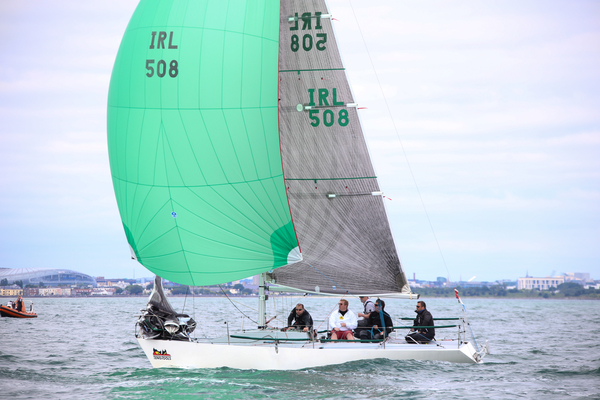
The 27-year-old Quarter Tonner Quest (Jonathan Skerritt) was overall winner in the ICRA Nats at the RIYC in Dun Laoghaire. Photo: David O'Brien

Downhill battle at the ICRA Nats with the Mills 36 Raptor (ex-Aztec) in foreground, while beyond is Peter Dunlop of Pwllheli's J/109 Mojito against the XP33 Bon Exemple (Colin Byrne, RIYC). Photo: Davd O'Brien
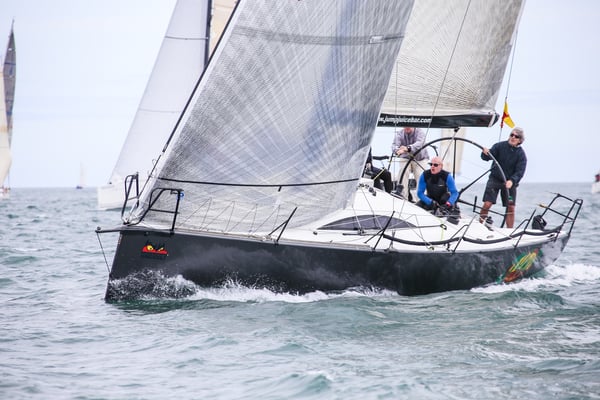
The Ker 36 Jump Juice (Denise Phelan) dominated Class 0 at the ICRA Nats. Photo: David O'Brien
The end of June, and it was Round Ireland time. Thirty-six boats started from Wicklow, 33 finished in a race which was mostly on the slow side, with mid-size boats having their day. The winner was Richard Harris's Sydney 36 Tanit from Scotland by just six minutes from the home favourite, Liam Shanahan's J/109 Ruth from the NYC in Dun Laoghaire. The French defending champion, Laurent Gouy's Ker 39 Inis Mor which sails in Ireland under the burgee of Clifden Boat Club, placed third while Frank Doyle of Cork, second generation round Ireland aristocracy as son of Denis of Moonduster fame, was fourth with his A35 Endgame.
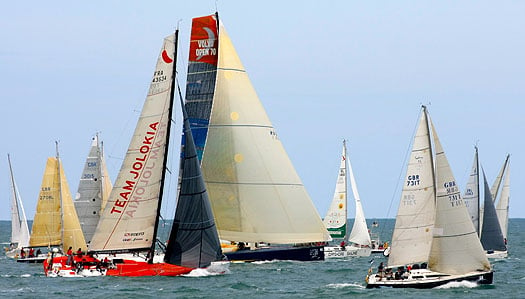
The start of the Round Ireland Race 2014 well illustrates the eclectic nature of the fleet. In right foreground is Richard Harris's Sydney 36 Tanit which was overall winner by just six minutes from the J/109 Ruth (Liam Shanahan), just beyond with the black jib, while the Volvo 70 Monster Project (David Ryan) comes thundering through the fleet at the beginning of a performance whch would see her take line honours win and thd class win in the CK Div.. Photo: Kevin Tracey
The same weekend as the Round Ireland race started, Lough Foyle sent the Clipper Fleet on their way after a week's festivities in Derry/Londonderry, made even more festive by the fact that Sean McCarter and his crew with the home town's boat had crowned their win in the Sydney-Hobart race with victory in the Transatlantic leg to Derry.
Clipper fleet in Derry
Crosshaven fairly leaped to life with Cork Week in July, and after several hitches in various boat-shipping plans, it was notable as the first time the Irish Commodore's Cup Team 2014 were seen together, and mighty impressive they looked too, with Quokka proving best on the Cork Week leaderboard.
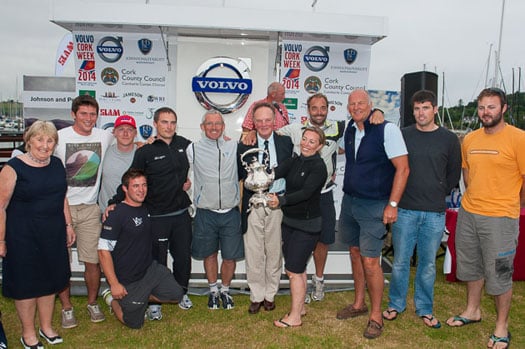
Michael Boyd (centre behind cup) and his Quokka crew, a member of Ireland's Commodore's Cup team, were overall winners of Cork week 2014. Photo: Bob Bateman
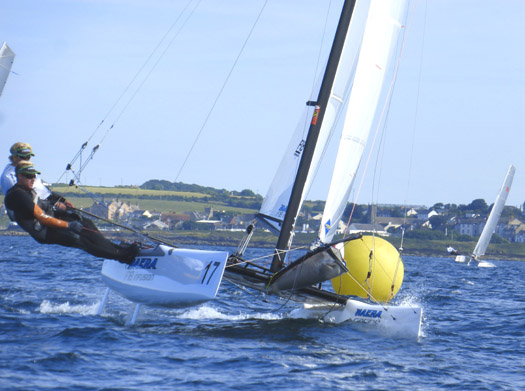
In the F18 Worlds at Ballyholme, Dutch skipper Gunnar Larssen (crewed by Ferdinand van West) is seen here putting in the smooth performance which saw him winning the worlds at his thirteenth attempt. Photo: W M Nixon
While all this excitement in racing boats with lids was building on the south coast in July, up north on Belfast Lough at Ballyholme the F18 Worlds were held for one of global sailing's most popular catamaran classes. Though the entry of 56 boats didn't match the 150-plus entries they get when the class has its worlds in its Mediterranean heartlands, the sailing was good and a popular winner emerged in longtime F18 sailor Gunnar Larsen, who is Dutch despite his Scandinavian name.
Dinghy attention was also very closely focused on Dublin Bay, with an enormous fleet of Optimists at the Europeans hosted by Royal St George YC from 12th to 20th July, and Dun Laoghaire really showing what it can do in being a major international regatta centre. France's Enzo Balanger was tops from Sweden's Kasper Nordenram, while best of the Irish in the Gold Division was Royal Cork's James McCann in tenth – not surprisingly, he was to go on to win the Nationals at his home club in August.
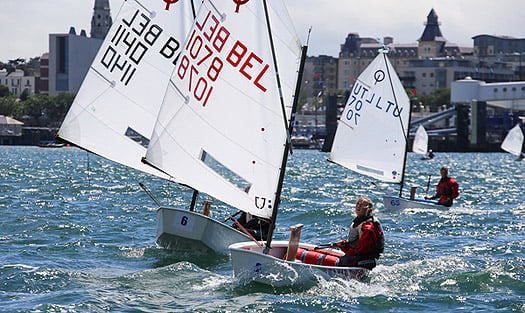
Nations from across Europe and beyond were at the Optimist Euros at Dun Laoghaire
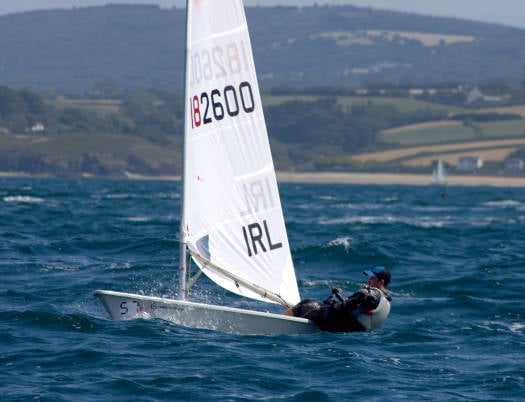
Finn Lynch racing at Douarnenez in France where be became the new U19 Laser Standard world championPhoto: Trevor Millar/Sail Coach
On the broader international scene, former Opty stars Finn Lynch (National YC) and Seafra Guifoyle (Royal Cork) were to turn in outstanding results during 2014, with Guilfoyle firmly in the frame through the ISAF Youth Worlds in the Laser, eventually coming home from Tavira in Portugal with the Silver, while Finn Lynch was on top form to clinch the Gold in the Under 19 Laser Standard Worlds at Douarnenez in Brittany.
Back aboard the boats with lids, late July had brought the Commodore's Cup in the Solent, and if anyone out there doesn't know who won, we'd like to hear from them, as the state of total seclusion which this implies is surely something which could be packaged and marketed to our hyper-informed and over-crowded world. The comprehensive Irish victory just seems better and better with the passage of time, and for Anthony O'Leary it was the highlight of a fantastic season which in September was to see him win the Helmsman's Championship of Ireland (admittedly by just a whisker) in J/80s in Howth to set up a national double for Royal Cork, as young Harry Durcan of Crosshaven was winner of the Junior Helmsmans. O'Leary meanwhile went on to win the 1720 Nationals in Baltimore later that month, and then in November his beloved Antix was named RORC Yacht of the Year.
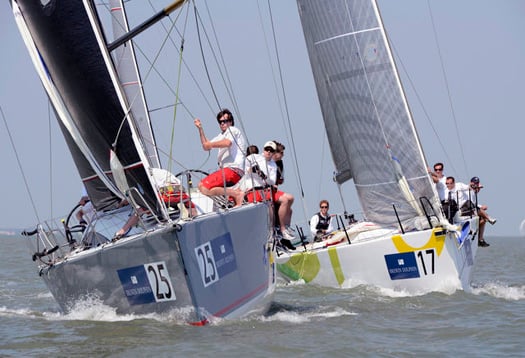
Antix in the Commodore's Cup, hanging in well coming to the weather mark to stay ahead of the newer Ker 40 Cutting Edge. Photo: Rick Tomlinson)
Even as Antix and her team mates were racing on towards glory in the Solent, in Clew Bay the West of Ireland Offshore Racing Association (WIORA) were staging their annual championship at hospitable Mayo SC, and it saw a good spread of results, with the overall winner being Galway's Liam Burke with his Corby 25 Tribal, while the runner-up was the McGibneys' Dehler Optimum 101 Dis-a-Ray, which sails under the Foynes YC burgee, but her home port is Tarbert further west along the Shannon Estuary.
August was busy with events for enjoyment. Eighty boats raced in Calves Week in West Cork, which has now been compressed to a four day regatta which means, as one sage family man observed, that you can take a house in Schull for a week's holiday, and then just as the wife and kids are getting fed up with having the ould fella always about the place, doesn't he absolutely have to go off and spend the last four days of the holiday sailing with his mates? That one of the top boats was Colman Garvey's True Penance maybe says it all.
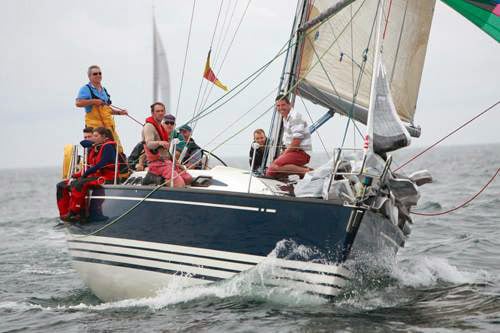
Calves Week 2014 entries were up 25% in 2014. Photo: Bob Bateman
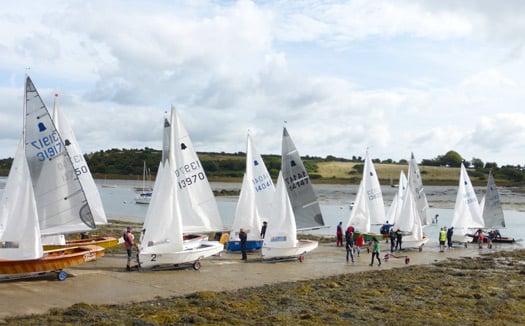
The GP14 Worlds at East Down YC in Strangford Lough launched a hundred boats every day in smooth style. Photo: W M Nixon
The biggest dinghy event of all (other than the Laser Nationals, which as ever are in a league of their own) was the GP 14 Worlds in mid-August at East Down YC in Strangford Lough, which had its excitement in a sudden storm on the Monday, but it all turned out okay. Boats involved were just over the hundred mark, the best boats were built in Northern Ireland by Alistair Duffin, and winners were English crew of Ian Dobson and Andy Tunnicliffe from Burwain, while top Irish were John and Donal McGuinness of Moville in Donegal, they were sixth.
At the other end of the intensity scale, down in Howth they had their first cruiser-racer two-hander for the Aqua Restaurant Challenge. Despite very restrained pre-publicity, it attracted 34 boats for a race round Lambay and the Kish. Stephen O'Flaherty's elegant Spirit 54 Soufriere, fresh from a win in the Panerai Classics in Cowes and co-sailed by David Cagney, took line honours and almost won, but the vintage Humphreys Half Tonner Harmony (Peter Freyne and Jonny Swann) just pipped them at the end.
Sailed in summery weather, the new Howth two-handed was about as different as possible from another two-handed experience in August, that of Liam Coyne (NYC) and Brin Flahive (Wicklow) in the 1800 mile RORC Seven Star Round Britain and Ireland. They didn't have to be two-handed, there were fully crew boats involved including the 70ft–trimaran Musandam in which Ireland's Damian Foxall played a leading role in taking line honours in record time, but aboard the First 36.7 Lula Belle the Irish duo just toughed it out despite sailing the last 500 miles with virtually nothing functional, they simply decided to see it through, and to their amazement found they'd won Classes V & VI.
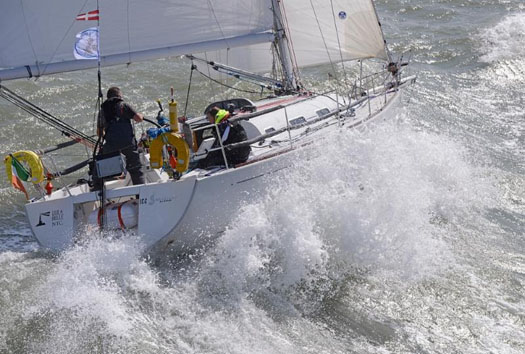
Lula Belle on her way out of the Solent with 1800 miles to race. Photo: Rick Tomlinson
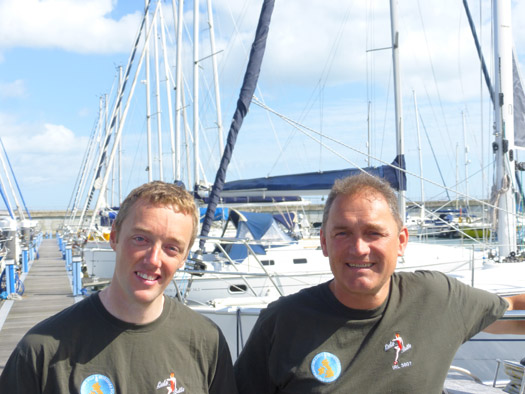
Brian Flahive & Liam Coyne back in Dun Laoghaire on the morning of their return from the finish of the Round Britain & Ireland Race. Photo: W M Nixon
As for the Laser Nats, they were at the end of August and another Ballyholme event, with Johnny Durcan of Royal Cork winning from Rory Fekkes of the home club, while the radials saw Annalise Murphy keep her hand in with a win from Cork's Cian Byrne.
After some rugged August weather, particularly on Ireland's East Coast, September was utterly blissful and it sweetly rounded out Dublin Bay Sailing Club's 130th season, the birthday being marked by a fairly epic dinner in the National YC. September also saw the conclusion of the slowly but steadily reviving Irish Sea Offshore Racing programme, with the end-of-season race from Pwllheli to Dun Laoghaire seeing Liam Shanahan's J/109 Ruth confirmed as the overall winner of the series. Among locally campaigned dinghies, meanwhile, Dun Laoghaire's keen Fireball Class kept its annual programme in lively shape, and the season drew a close with Barry McCartin and Conor Kinsella winning overall from Noel Butler and Stephen Oram.
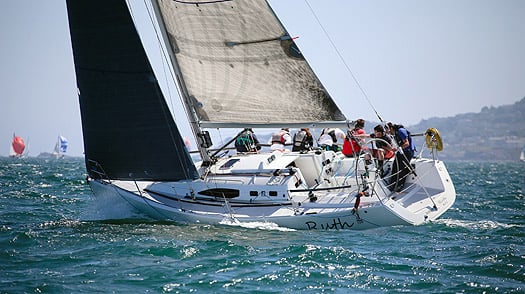
ISORA Champion Ruth skippered by Liam Shanahan jnr from the National Yacht Club
Across country in Limerick, the CityOne dinghies and the traditional Shannon gandelows created in projects of the Ilen Boatbuilding School made their debut in the city centre on one of the last days of the Indian summer, and then they were put on display in a Naumachia in St Mary's Cathedral which was officially opened by Michael Noonan TD, and later formally visited by President Higgins.
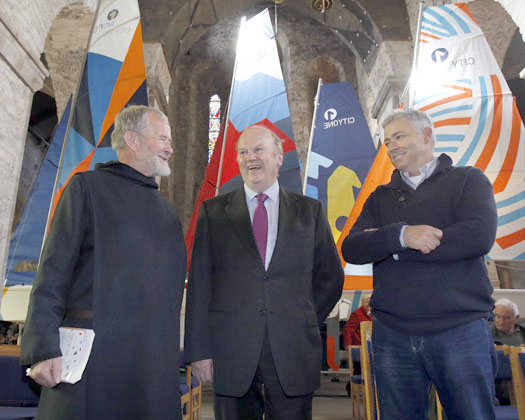
The hopeful new spirit of Irish sailing in 2014 was evident in St Mary's Cathedral in Limerick, when the CityOne dinghies built by volunteers in an inner city revitalisation project went on display in a Naumachia in the Cathedral on September 26th, after their first regatta on the Shannon in the heart of Ireland's City of Culture 2014. With the boats in the cathedral were (left) Brother Anthony Keane of Glenstal Abbey (Director, the Ilen School), Limerick's senior TD and Ireland's Minister for Finance Michael Noonan, and Gary MacMahon (right) Director of the Ilen School & Network for Wooden Boatbuilding. Photo: Press22
And then more vigorous winds returned in October, with the Freshwater Keelboat event on Lough Derg – originally just an exclusive Dragon thing – finding itself swamped with sixty and more boats from five classes and increasingly rugged conditions, such that only the Dragons and Squibs managed to get in any meaningful racing, with Neil Hegarty (RStGYC) winning the Dragons while James Matthews and Rob Jacob of Kinsale topped the Squibs.
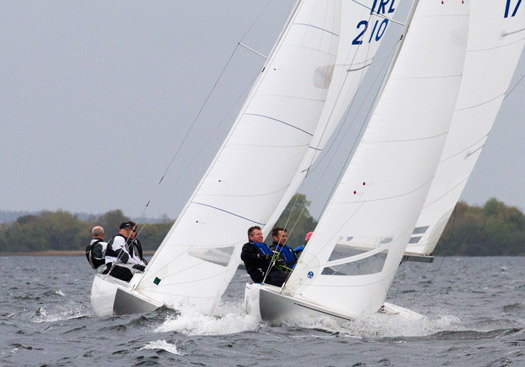
Dragons in Autumn action on Lough Derg – Neil Hegarty (right) was overall winner from runner-up Richard Goodbody (left) Photo: Gareth Craig
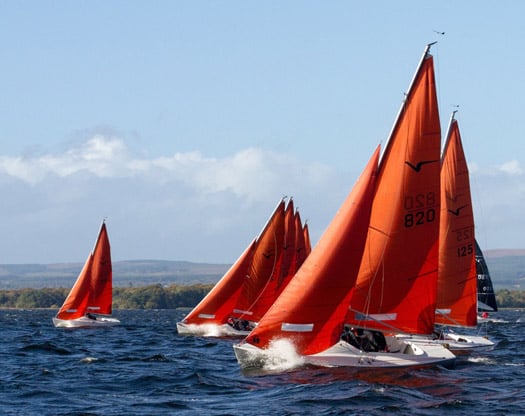
Squibs on Lough Derg – it may look like perfect sailing, but the top came off the weather very soon afterwads. Photo: Gareth Craig
The Student Yachting Worlds in La Rochelle in October had some hiccups in UCD's campaign for Ireland, but while they very narrowly missed the podium in a truly international event, they stayed put at fourth overall. And round in the Mediterranean, a record fleet for the Rolex Middle Sea Race from Malta saw entries soar through the 120 mark for the first time, and the 606 mile race had its first half in light breezes, but the second half was in pure Mistral, with people talking of "winds easing to 44 knots....." A Maltese-owned J/122 won, but second overall and first in her class was the Xp44 XpAct (Josef Schultheis) with a strong Irish emphasis in her crew including Barry Hurley, Andy Boyle, Kenny Rumball and Phillip Connor.
Soon afterwards, the Volvo World Race got under way with first stage from the Med to Cape Town, and Ireland's Justin Slattery on the winning boat on Leg 1. Back home, Autumn leagues had seen renewed enthusiasm as though people had suddenly re-discovered their sport, and the great sailing year of 2014 drew towards its close with the Lasers in Howth starting their 40th winter of annual frostbite racing. This means that HYC have now had a continuous sailing programme since April 1974, while across in Dun Laoghaire the DMYC Frostbite Series must be the most senior of all winter events. Winter Leagues attract more aficionados, with the popularity of the Dublin Bay Turkey Shoot in particular providing a forceful reminder that Dun Laoghaire is the principal sea access for a notably affluent and very large population in South Dublin. With the Turkey on its way, soon it's Christmas. And then the new Irish sailing season will begin on the blue waters of Sydney Harbour.
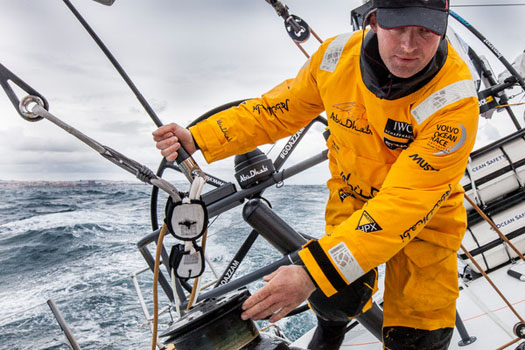
Justin Slattery on Volvo World Race 2014. Photo: Volvo Ocean Race
#irishsailing – The Irish Sailing Association (ISA) has axed two senior roles, scrapped its annual conference, sold its jet–ski fleet and is drafting new policies to 'refocus on core activities'. The moves are part of a fundamental restructuring programme announced this week by its president David Lovegrove.
The redundancies follow a far reaching strategic review report commissioned by Lovegrove on taking office six months ago.
Commodores from a network of over 100 sailing clubs across the country were advised of the new blueprint for Irish sailing by email this week. (The documents that include an executive summary of changes and an organisation chart are available to download below as PDF files).
The plan follows a period of severe criticism aimed at the National Governing Body that admits it was 'out of touch' with its members.
A discredited 2012 strategic plan was aimed at 'growing the organisation' at a time when the sport was in decline, betokening a culture within the ISA that had not kept pace with a sport that had changed dramatically.
Lovegrove's new board thus has major issues facing it, not least the fact it has lost a quarter of its members and key yacht clubs are in choppy financial waters.
How Sports Council funding and ISA club affiliation funds are spent is at the heart of the matter. For over a year critics of current policy say there is an 'over-emphasis of the training of selected juveniles by the creation of elite squads of possible future Olympians'.
In round terms, the association turns over €2million per annum, €1m is ring fenced for the Olympic team. Another €1m is provided by clubs and other state grants that say critics is largely eaten up by the bureaucracy of the organisation.
This morning Lovegrove rolls out the first stage of a 'remodelled organisation' that he claims is focussed on servicing the needs of grass roots sailing enthusiasts but also retains its commitment to the Olympic dream. It's a big ask but Lovegrove says he is serious about bringing about change.
As a result, the senior roles of the Training and Racing Manager have been made redundant with immediate effect.
It's just one of a number of key operational and policy changes that have already taken place and are contained in documents entitled The 'Way Forward' that are downloadable below as PDF files.
As the association disposes of jet skis and other 'services' that have been cut out of the operation, it is becoming clear that activities such as the ISA Black Tie Ball, the purchase of jet skis and other trappings symbolised an ISA that acted in its own interests and not in those of the sailors that elected it.
The heave against the organisation began at the 2013 agm when two dinghy sailors – one from the west coast and one from the east – proposed a motion seeking change. It paved the way for over 300 'suggestions for change' heard at a stormy meeting in the National Yacht Club in April 2013.
Over a year later, the new board includes Brian Craig, a leading light in the organisation of sailing in Ireland.
Also included is former ISA President Roger Bannon, an outspoken critic of recent ISA policies. A dinghy and sportsboat champion in his own right, Bannon used his term in office two decades ago to secure the position and financial viability of the association as a national sporting authority by making every member of a sailing club in Ireland also a member of the ISA.
It was a bravo move that unified Ireland's sailing clubs into a stronger whole fit to nurture the talent necessary to challenge the world at the top levels of sailing. But in more recent times as that fitness was called into question, Bannon was among those who hit out at an authority that had arguably lost its relevance to all bar those at the most elite levels in the sport.
In a call for change on Afloat.ie last March, "The ISA has lost its way over the last few years," Bannon said, giving his view of a bureaucracy "detached from the reality of what is going on in the front line".
But it appears all that is now in the past. Today, Lovegrove says 'the primary challenge is the necessity to remodel the ISA into an organisation with relevance and accessibility to its members, affiliated organisations and training centres'.
Lovegrove maintains this has to be achieved with initiatives that are seen to have a positive impact at grass roots level.
'The ISA's role has to change in emphasis from being largely a regulator of standards to one of providing guidance and support to its members and the organisations affiliated to it', he added.
Details from the executive summary:
Strategic Plan
Under the Chairmanship of Neil Murphy (a member of Howth and Malahide Yacht Clubs), a Strategic Planning Group is developing a draft Strategic Plan 2015-2020. Following consultation with the clubs and affiliated organisations, the new Plan will be presented for approval at the AGM in March 2015. The underlying focus for the Plan is to: "Develop Sailing in partnership with Clubs, Training Centres & Affiliated Organisations". The Board recognises the need for the ISA to work in union with member organisations to build a strong network of clubs and affiliated organisations. This will be the Mission for the next five years.
Policy Groups
Specialist groups in Training, Communications, Competition, Cruising, High Performance, Participation, Government and Risk Assessment will assist with the implementation of the Strategic Plan. These groups will play a key role in connecting with the membership and harnessing the volunteer expertise amongst the sailing community. These groups are up and running and the initiatives already underway are set out in the more detailed document.
Reorganisation
The Core or main body of the Association is being reorganised but the High Performance area remains unchanged.
The objective of the reorganisation is to create a more cost effective structure providing accessible expertise at a local level to help Clubs and Affiliated Organisations, increase and retain members. That local expertise will also help facilitate access and increase the numbers participating. The efficient delivery of support services to members remains a major priority.
The roles of Training and Racing Manager are being made redundant as part of this plan. This will allow key resources be redirected at a local level through the investment in Regional Development Officers (RDO'S). It is, when finances permit, proposed to recruit an additional RDO for the Eastern Region and redefine the territories of the two existing RDO's. The changed structure will also allow the Association channel funds into areas of more direct benefit to sailors.
The RDO's, whose primary role is to support the Clubs, will each specialise in individual areas of expertise such as Racing, Participation, and Communications. After the reorganisation, Training and Racing will continue to be pivotal areas of activity and the Board is confident that the necessary expertise and resources are available to support these activities.
Refocus on Core Activities
In an environment where the ISA's members have difficulty sustaining existing activity levels, it is essential that the Association focuses resources on the core activities of members, be it sailing or motor-boating. Peripheral areas of activity are under review and some may be exited over time to ensure the focus of the ISA is not deflected from its primary responsibilities to its members.
Continuity of Operations and Service
The continuity of activities and maintenance of service remain of paramount importance to the Board and staff of the Association during this period of change. The ISA will continue to service the wide range of activities expected of the Governing Body for Sailing. 2015 will be a pivotal year in executing these changes and we look forward to working together to achieve these challenging goals.
Despite light weather and a number of clashing events, the traditional end of season All Ireland youth sailing Inter-schools event at Sutton Dinghy Club attracted 91 boats across 11 classes, 21 schools and 119 sailors. Now in its 39th year, this event continues to be as enjoyed and as hard fought as ever across both Mixed and Optimist Fleets.
The 72 boat Mixed Fleet which saw 10 different classes produce close and tight racing under Portsmouth Yardstick. The PRO team of Jim Lambkin, supported by Liam Dineen (Skerries) and Scorie Walls did exceptionally well to get all 4 races in over the 2 days.
6th year student and team captain Thomas Natin (Laser Full), who has sailed in the event since his first year in Belvedere, went out in a blaze of glory taking the Individual Trophy, from St Fintans Robert Dickson & Lochlann O'Shea (Mirror), with Mount Temples Daniel Hopkins Laser 4.7) in 3rd.
Even with victory in the Individual series, Belvedere College had to be content with 4th place overall as St Fintans Sutton (Robert Dickson, Lochlann O'Shea, Darragh Kelly) took the Team Trophy (Conor Nolan Memorial) from a clearly delighted Sligo Grammar School (Fergus Collins, Harry Collins, Sam & Imogen Wray) with Blackrock College (Conor Byrne, James O'Connor, Patrick Riordan) taking 3rd. Sligo Grammar were 1 of 3 Sligo schools who made the trip to Sutton for the event.
Despite a clash with end of season Optimist event across the bay, the Interschools Optimist Fleet saw 19 boats take to the water with the PRO team of Paul Kavanagh and Padraic Boyle deciding to get 3 races in on Saturday on the off chance Sunday might be even lighter. The Individual Trophy went to Ella Hemeryck (Loretto Stephen Green) by a single point from Luke Rickard (Gonzaga) with Hugo Kennedy (St. Michaels) in 3rd.
The Team Trophy saw perennial contenders Belvedere College (Ben McDonald, Conor Waddilove, Sam Crawford) retain the title with Burrow School Sutton (Jonathan Sargent, Sophie Dix, Kirsten Quinn) 2nd with Loretto Balbriggan (Francis Mulholland, Ella May, Stephanie O'Connor) 3rd.
That 2nd place overall meant Burrow School Sutton took the Primary School Trophy.
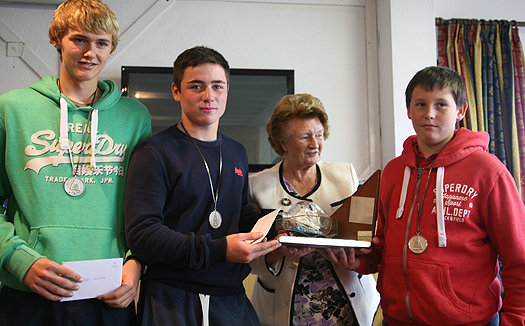
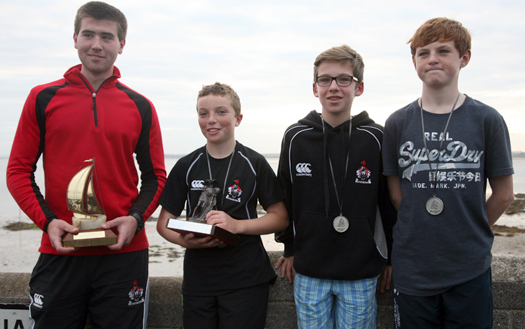 ––
––
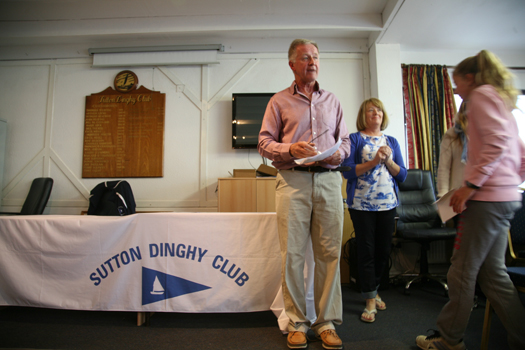
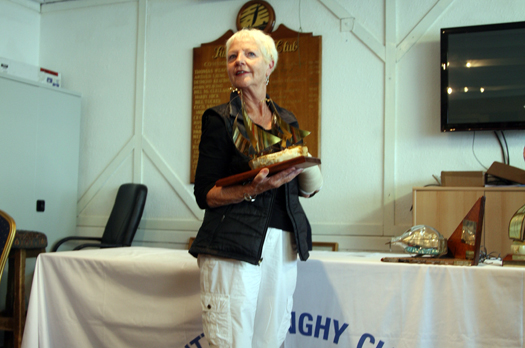
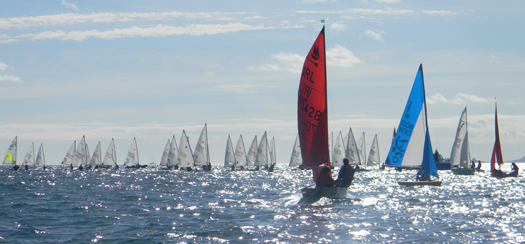
The O'Tiarnaigh Trophy for best Sutton Dinghy Club helm went to Darragh Kelly sailing for St Fintans Sutton who finished 4th overall sailing a Laser Radial.
This Trophy, presented by former Commodore Muriel O'Tiarnaigh, is in honor of her late husband, former Commodore and Belvedere teacher Riocaird O'Tiarnaigh who introduced the Inter-schools Sailing event back in April 1995. The 39th running of the event saw their grandson Fionn Mulhall take part in the Optimist fleet for the first time.
The 40th running of this event next year, should be a very special event.
Final List of 'All Ireland Sailing' Invitees Published for Howth Competition
#allirelandsailing – The Irish Sailing Association (ISA) has issued its final list of invitees (see below) for tomorrow's All Ireland sailing championships at Howth Yacht Club together with clarification on how the selection for the competition was conducted.
The explanation follows comment from sailors on this site as to why some of the country's biggest classes, such as the Laser dinghy and Flying Fifteeen keelboat were not invited.
In a statement, the ISA says it gives 'certain discretion' to a steering group in how it operates the selection criteria. It says these are published in the letter to classes requesting their nominations.
The statement continues 'The main operating difference for tomorrow's competition was the request for 2014 National Champions to be nominated and that a place would not be passed to a another sailor. Classes who had not completed a nationals by August 25th could use a ranking list. The objective was to ensure that as many class national champions as possible would get an opportunity to compete in the 2014 championship'.
According to the ISA, the basic rules are:
The class must have their ISA affiliation for 2014 paid in full.The Race Officer at the national championships has to be a National RO, or Regional RO under mentoring by a National RO. This is an ISA Policy from 2005 designed to improve the standard of racing at class championships. For this purposes the ISA recognises the qualification of officials from other national authorities e.g. RYA, FFV as well as ISAF International ROs.The SG are not permitted to select from classes that do not comply with one or other these rules.
All other nominees were considered and the selection process set out in the report was followed. The top three dinghy and keelboat classes based on numbers at their national championships were selected first, that gave six. The remaining classes, dinghy and keelboat together, were then ranked in order of numbers and the next nine selected. Where there were equal numbers a lottery was held to determine the order. The remaining classes were ranked in order for call up, by lottery, if and when a place became available.
Some nominees were unable to accept places due to pre-existing commitments (e.g. family engagements or competition abroad as part of ISA Squads) and the places awarded to other classes in order of the selection. In other cases the nominee was not able to accept a place.
Full text here
2014 ISA All Ireland Invitees
|
Name |
Surname |
Club |
Class |
|
|
Alex |
Barry |
Monkstown Bay SC |
RS400 |
National Champion |
|
Ben |
Duncan |
Defending Champion |
Champion 2013 |
|
|
Richard |
Evans |
Howth YC |
ICRA 2' |
National Champion |
|
Laurence |
Hanley |
Lough Ree YC |
Shannon OD |
National Champion |
|
Chris |
Helme |
Royal St George YC |
Ruffian |
National Champion |
|
Stefan |
Hyde |
Royal Cork YC |
SB20 |
National Champion |
|
Guy |
Kilroy |
Royal Irish YC |
Water Wag* |
National Champion |
|
Ian |
Nagle |
Royal Cork YC |
ICRA '1' |
National Champion |
|
Flor |
O'Driscoll |
Royal St George YC |
J24* |
Ranking Champion |
|
Anthony |
O'Leary |
Royal Cork YC |
Commodores Cup & 1720 |
National Champion |
|
Pat |
O'Neill |
Clontarf Y&BC |
IDRA 14 & E-Boat |
Double National Champion |
|
Jonathan |
O'Rourke |
National YC |
Mermaid |
National Champion |
|
Conor |
Phelan |
Royal Cork YC |
ICRA '0' |
National Champion |
|
Conor |
Turvey |
Howth YC |
Howth 17 Footer |
National Champion |
|
Roy |
Van Maanen |
Greystones SC |
RS200 |
National Champion |
|
Ross |
Vaughan |
Royal North YC |
Squib |
National Champion |
#irishsailing – The new broom of the Irish Sailing Association (ISA) board is expected to sweep clean in the coming weeks when it publishes a blueprint for an association struggling to show relevancy in a sport it claims to govern. At the heart of the matter is why approximately €1m in state and club funding is being absorbed annually to sustain ISA bureacracy. In 1998, the ISA had 16,000 members and 3.5 staff, today membership is somewhere between 16 and 18,000 with 14 staff.
A discredited 2012 strategic plan is now under the mircroscope as pointed questions are being asked about how the ISA got so far off course. Hints at what the future holds for the organisation are beginning to appear with, for example, the sale of state funded ISA assets such as Jet skis.
The five big Irish yacht clubs that each pay annual subs of up to €30,000 per annum into the national body have sought change and while some insiders are unhappy with the pace of reform (three former presidents confronted then president Niamh McCutcheon with concerns a year ago) it looks certain new president David Lovegrove will map out the essential changes envisaged at tonight's ISA board meeting in Galway.
Some of the country's leading sailing administrators are now board members drafted in especially to address the massive issue of dwindling participation including former president Roger Bannon, Royal St. George's Brian Craig and 2012 Olympic race officer Jack Roy.
The imminent report into the ISA is discussed in today's Irish Times Sailing column by David Branigan and how Irish Sailing needs to confront new realities was discussed last week in W M Nixon's Sailing blog. Who is to blame for the crisis in Irish Sailing was also featured by Tom MacSweeney in his Island Nation blog.




























